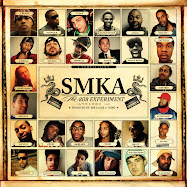In past years the festival has included acts as diverse as Madonna, James Brown, KRS-One, Ben Harper, Daft Punk, The Cure, and Wolfmother. This year, some think that Coachella “got back to its roots” by filling their set list with dozens of indie and alternative bands, spearheaded by a reunion performance by Rage Against the Machine. As a result, the crowd was fairly monolithic: hippies and indie kids with a dash of Rage. A lineup of The Arcade Fire, Kings of Leon, Hot Chip, Of Montreal, Bjork, and The Good, The Bad & The Queen reads more like a college radio playlist than an all-encompassing music festival.
Hip-hop got a little bit of representation. I initially circled all the hip-hop groups slated to perform, and the weekend looked pretty solid on the rap front: Brother Ali, DJ Shadow, El-P, Busdriver, Pharoahe Monch, Ghostface Killah, Lupe Fiasco, and The Coup graced the lineup, culminating in a showing by The Roots on Sunday. I didn’t mak
 e it to all of the above—after all, I was there to see new bands and styles—but I was shocked at the overall feel I got from the two predominant hip-hop shows I did see: Pharoahe Monch and The Roots.
e it to all of the above—after all, I was there to see new bands and styles—but I was shocked at the overall feel I got from the two predominant hip-hop shows I did see: Pharoahe Monch and The Roots.Neither act was tainted by the usual suspects; the quality of the music was top-notch, and even the 95% rock-oriented, white crowd showed proper love. But both Pharoahe and The Roots, amidst delivering dope shows, played off of the tired ‘hip-hop is dead’ maxim, and pleaded to the audience to support their quest to ‘keep hip-hop alive.’ Each artist said almost the same exact thing, and I quote near-verbatim, “They say that hip-hop is dead. That’s what they’re saying but we’re working our hardest to keep it alive.”
Now, Nas aside, who else really thinks that hip-hop is dead or dying? Rap-loving geezers have been declaring their beloved form of hip-hop extinct since ’93 in what seems to be a trend of nostalgia for movements within hip-hop that resonated deeply for certain generations. Thirty-somethings long for the days of LL Cool J and Run DMC; others insist on keeping A Tribe Called Quest or KRS-One records on steady rotation in the Walkman; still others cling to the poetry of Tupac. All of them are justified in loving the breed of hip-hop they love. All of them, though, are also short-sighted, self-righteous and dogmatic grandpas who should give an open mind to hip-hop’s evolution.
I guess Murs said it best on the Felt 2 track “The Biggest Lie”: “The problem with hip hop? Shit nothing at all / It's an art form, it ranges, and it changes and evolves / It's not always for the better, but be patient with it ya'll, / ‘Cause our time will come and the wicked will fall." Melle Mel recently called hip-hop “stagnant,” and he does have a point. Nobody, as he argues, will ever be as influential to hip-hop as Grandmaster Flash and the Furious Five. But does that mean that hip-hop is dead? Dying? Absolutely not. It simply means that the founders of a movement are always the most influential actors in its progression. They set the original rules and traditions for others to experiment with. But creative evolution within that original framework can’t be denied as progress.
Most upsetting about the assertion that hip-hop is dead, especially on the part of The Roots, is the effect it is bound to have on hip-hop’s public image. Remember that this crowd assembled to see indie rock acts, and is probably fairly ignorant to hip-hop. Given this demographic, how is it useful to essentially beg the audience to save rap? They gave the impression that hip-hop, which as far as I’m concerned is still healthy and well, is melting away hopelessly like the ice-caps. I felt like a volunteer at a desperate charity event.
They might as well have just accepted their own inconvenient truth, alienated all their fans and played indie rock instead of their own material. In fact, Black Thought and gang got pretty close, playing a total of three or four actual Roots songs buried in an entertaining but confusing stew of covers ranging from Mims’s “This Is Why I’m Hot” to Kool & the Gang’s “Jungle Boogie” for most of their set. I’m told they did the same thing when they performed at USC, but I’ve seen them several times at their own billings when they’ve stuck to strictly Roots material. Why do they feel the need to appropriate their shows for white audiences? It cheapens them and it cheapens hip-hop.
Props to the sound team at Coachella for making every act crystal clear and balanced. It was by far the best sound quality at any show I've attended.




.jpg)








2 comments:
Well-said. I know what you mean about marketing that "hip hop is dead" stuff to a crowd that really doesn't know anything about hip hop. It just gives them more of an excuse to think of hip hop as a second-rate art form.
That said, the Nas album was dope and of course I feel where he's coming from. But since rap is always under attack from social critics I think its better to promote unity than division within the genre, if only for the benefit of uneducated outsiders.
good points. and yea, the roots do that waay too much. I feel you on that.
Post a Comment